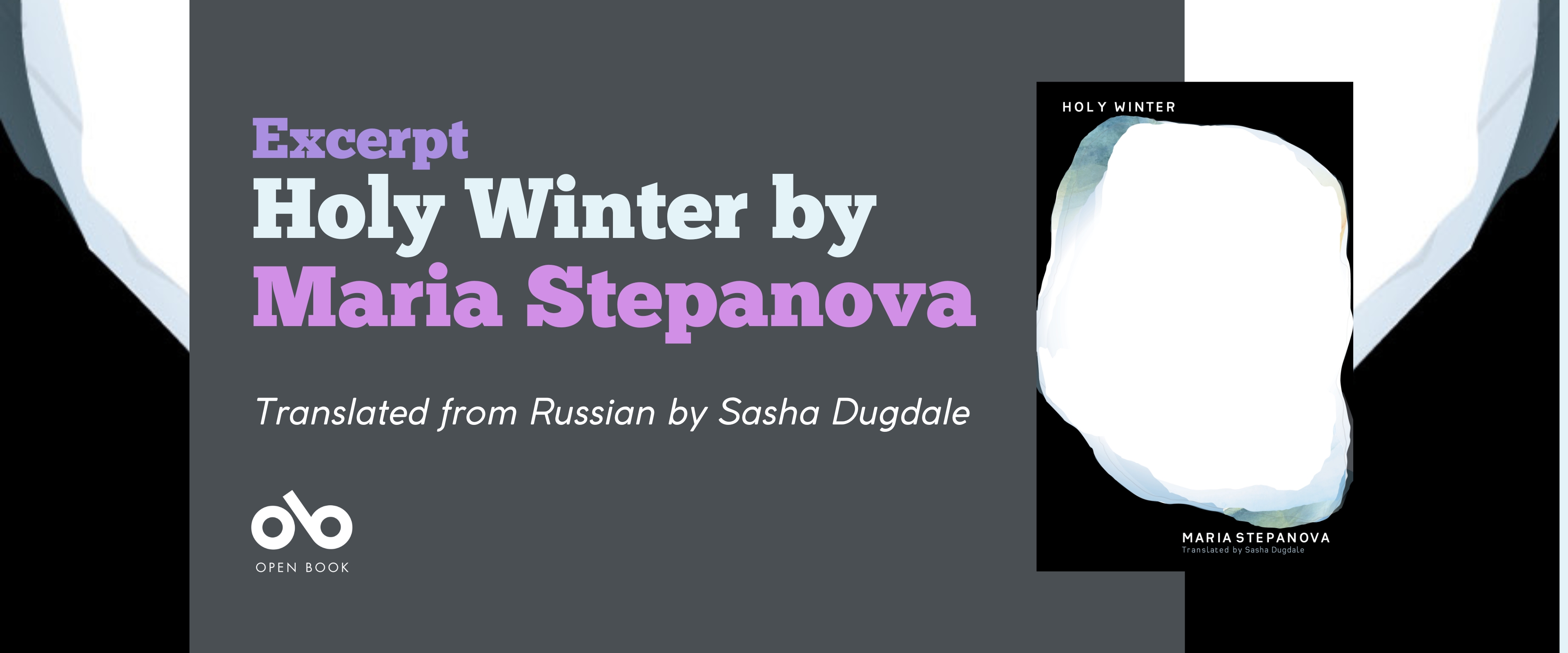Read an Excerpt from Holy Winter by Maria Stepanova, Translated by Sasha Dugdale
A powerful and influential figure in Russia's cosmopolitan literary scene, Maria Stepanova watched this world torn away by Putin, and by the suppression and civil liberties violations that followed.
In Holy Winter (Book*Hug Press), the author flies into a rush of poetic inspiration, with poetry that captures winter and war, banishment and exile, social isolation and existential abandonment. She melds form by intertwining signals from the media and social networks, love letters, travelogues, and fairy tales, and creates a rich and varied collection that reaches back to the greatest Russian wordsmiths and closer contemporaries like Sylvia Plath, Inger Christensen, and Anne Carson.
We've got an excerpt from the Holy Winter to share with our readers today on Open Book. Read on to immerse yourself in this poet's masterful work:
Excerpt from Holy Winter by Maria Stepanova, translated by Sasha Dugdale
What a winter towering in the yards
Like an oak
Like a stump
Like a shrine
Your CanLit News
Subscribe to Open Book’s newsletter to get local book events, literary content, writing tips, and more in your inbox
Airborne particles of frost-ash
Tiny cavalry officers
Circling the guilty head
Diving on its very dome
Time for hibernation.
As an undone corpse subsides where it is slain;
Inexorable as the gathering pace of a train
Lie then, where you are laid
For the rules are already made.
There was once a hare, and once a vixen
And they lived by the deep blue sea.
First they lived in an ancient dugout
But then they both built homes
The vixen built a house of ice
And I’ve heard the hare’s was of mica
Built from timid hare-tears
And sad cabbage saliva
And so they lived in harmony, hare and fox
On holy days they set off fireworks.
—I had a dream: In my dream a table, and on it
Lay the most wondrous youth
And he was arrayed in
Palest attire, sable shroud.
—Little Mother, most gracious Majesty!
—My marble-hewn hero.
My own darling, quite beyond compare
How I love you. Wait and see.
Then everything went to sleep:
The wind in the chimney, the fire in the hearth,
And an ache in a head, and the water in the tap.
Then everything stopped still:
The hairdresser at the end of a shift in her overalls
Her legs stretched out, eyes half-shut
And the homeless man in the stationary tram
And traffic lights, switched to amber
And in the winter air the police batons
And the yellow sky, supported by pillars of smoke
And people in furs in hats in police vans
And people apprehended at their registered address
Their almost transparent houseplants
Their speechless domestic animals
Their warm clothes, their cold drinks
We, wrapped in snow for safe-keeping
Like pictures overlaid with glassine,
Suddenly came to a stop.
I remember when I was packing to leave, for life
That first time I felt my spirit dumb within me
As if it knew what it would now have to learn
And my wife wept, and my two friends, the bravest ones,
But my daughter was away, she’d come home to find me gone.
Dawn broke—and half the night spent burning
manuscripts and documents.
I took no clothes, I chose no slaves to take with me.
When I think back I find myself already on the ship
The sea all around me, the sea on the decks,
The helmsman prays, the water roars, sailors swear,
My nostrils fill with waves but I write on
Let’s see what tires first, the storm, or my appeal.
____________________________________________
Maria Stepanova, born in Moscow in 1972, is one of the most powerful and distinctive voices of Russia’s first post-Soviet literary generation. She is an award-winning poet, novelist, essayist, and journalist. Stepanova’s works have been translated into many languages and published widely. She has received several literary awards, including the prestigious Andrey Bely Prize and Joseph Brodsky Fellowship. Her novel, In Memory of Memory, was a finalist for the 2021 International Booker Prize and has been translated into many languages. Stepanova founded and was editor-in-chief of the online independent crowd-sourced journal Colta.ru, which engaged with contemporary Russia’s cultural, social, and political reality until the full-scale Russian invasion of Ukraine when all dissenting media in Russia were forced to shut down. As a prominent critic of Putin’s regime, Stepanova had to leave Russia and is now living in exile in Berlin.
Sasha Dugdale is a poet and translator. She has published five collections of poetry with Carcanet (UK), the most recent, Deformations, was shortlisted for the T. S. Eliot Prize. She is a translator of Russian drama and poetry, including work by Elena Shvarts, Maria Stepanova and Marina Tsvetaeva, and former editor of the international magazine Modern Poetry in Translation.




